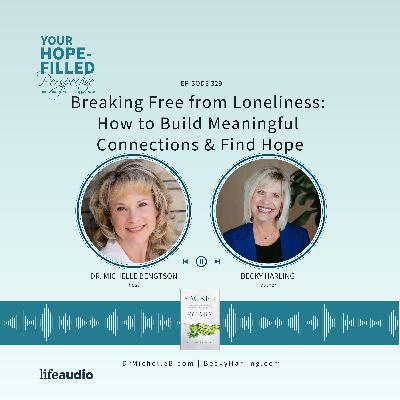How to Silence Your Inner Critic
Update: 2025-06-26
Description
Episode Summary:
The inner critic can be a constant and discouraging presence, stealing our joy and hindering us from walking in the confidence God intends for us. It often disguises itself as self-improvement or humility, but in reality, it holds us back from embracing our identity in Christ. In today’s episode, we’ll uncover the sources of this voice, explore how Scripture equips us to combat it, and learn practical, biblically-based strategies to replace self-condemnation with God’s truth.
Quotables from the episode:
- The inner critic is that internal voice that condemns, shames, or reminds us of our shortcomings. It whispers lies like, “You’re not good enough,” “You’ll never succeed,” or “Who do you think you are?” Often, this voice feels louder in moments of vulnerability, failure, or self-doubt.
- Scripture reminds us that Satan is the accuser of the brethren (Revelation 12:10 ). His goal is to steal, kill, and destroy our confidence and joy (John 10:10 ). He plants seeds of doubt and discouragement, hoping we’ll lose sight of God’s truth about our identity. The enemy’s accusations often feel like they’re coming from within, making it harder to recognize their origin.
- Our sinful nature and brokenness often give rise to self-condemnation. Past experiences, such as critical words from others, failures, or unmet expectations, can leave scars that fuel the inner critic. We may strive for perfection, believing the lie that we’re only worthy if we meet certain standards. This striving often leads to exhaustion and deeper feelings of inadequacy.
- The world bombards us with messages that we must perform, achieve, or conform to be loved or valuable. Social media, advertisements, and cultural expectations paint a picture of perfection that is impossible to attain. When we fall short, the inner critic seizes the opportunity to amplify our insecurities and remind us of our perceived failures.
- For some, the inner critic’s voice mimics the critical or harsh words spoken by authority figures in their lives, such as parents, teachers, or peers. Over time, these external voices become internalized, shaping how we see ourselves and respond to challenges. Even well-meaning criticism can leave an imprint if it’s not tempered with grace and encouragement.
- The inner critic is not God’s voice. In fact, His voice always aligns with truth, hope, and encouragement.
- It’s important to identify and challenge thoughts that contradict God’s truth. Taking every thought captive means actively rejecting lies and replacing them with God’s promises.
- God’s voice always aligns with His character—He speaks love, encouragement, and restoration. While the inner critic seeks to tear us down, God’s Word builds us up and reminds us of our identity in Christ.
- By meditating on Scripture, we can discern the difference between the voice of the inner critic and the voice of our loving Father. His truth gives us the strength to silence the lies and walk confidently in His grace.
- God’s voice brings peace, conviction (not condemnation), and hope. He calls us to see ourselves as He does—fearfully and wonderfully made (Psalm 139:14 ).
- Become aware of when the inner critic is speaking. Pause and ask, “Is this thought true, or is it a lie?” If it doesn’t align with Scripture, it’s not from God. Journaling your thoughts can help you identify patterns of self-criticism and pinpoint recurring lies that need to be addressed.
- Counter every negative thought with God’s Word. For example, if the thought says, “I’m a failure,” remind yourself of Philippians 4:13 : “I can do all things through Christ who strengthens me.” Create a list of Bible verses that speak to your identity in Christ, and keep them handy for moments of doubt.
- A grateful heart leaves little room for self-criticism. Start each day by thanking God for His blessings and affirming the ways He’s working in your life. When you focus on God’s goodness, it shifts your perspective and quiets the critical voice.
- Surround yourself with people who speak life and encouragement. Proverbs 27:17 says, “As iron sharpens iron, so one person sharpens another.” Healthy, godly relationships provide support, accountability, and reminders of your worth in Christ. Be intentional about building connections with those who uplift you.
- Ask God to help you distinguish His voice from the lies of the enemy. James 1:5 assures us that He gives wisdom generously to those who ask. Pray for clarity and ask the Holy Spirit to guide your thoughts and words.
- Instead of agreeing with the critic, declare the truth of who you are in Christ. Say things like, “I am chosen,” “I am loved,” and “I am forgiven.” Speaking these affirmations aloud helps to reinforce them in your mind and heart.
- Whether it’s critical people, social media, or unhelpful comparisons, protect your mind by setting healthy boundaries. Consider a social media detox or limiting time spent with individuals who are overly critical or draining.
- Silencing your inner critic is not a one-time fix; it’s a daily practice of renewing your mind and grounding yourself in God’s truth. Remember, the voice of the inner critic is a liar. God’s voice is the only one that matters, and His voice speaks love, grace, and purpose over you.
Scripture References:
- Romans 8:1, which declares, “Therefore, there is now no condemnation for those who are in Christ Jesus.”
- Ephesians 2:10 reminds us, “For we are God’s handiwork, created in Christ Jesus to do good works, which God prepared in advance for us to do.”
- James 3:9-10 “With the tongue, we praise our Lord and Father, and with it, we curse human beings, who have been made in God’s likeness... My brothers and sisters, this should not be.”
- Isaiah 41:10 “So do not fear, for I am with you; do not be dismayed, for I am your God. I will strengthen you and help you; I will uphold you with my righteous right hand.”
- 2 Corinthians 10:5 “We demolish arguments and every pretension that sets itself up against the knowledge of God, and we take captive every thought to make it obedient to Christ.”
- Psalm 139:14 “I praise you because I am fearfully and wonderfully made; your works are wonderful, I know that full well.”
- Sacred Scars: Resting in God’s Promise That Your Past Is Not Wasted by Dr. Michelle Bengtson
- The Hem of His Garment: Reaching Out To God When Pain Overwhelms by Dr. Michelle Bengtson, winner AWSA 2024 Golden Scroll Christian Living Book of the Year and the 2024 Christian Literary Awards Reader’s Choice Award in the Christian Living and Non-Fiction categories
- YouVersion 5-Day Devotional Reaching Out To God When Pain Overwhelms
- Today is Going to be a Good Day: 90 Promises from God to Start Your Day Off Right by Dr. Michelle Bengtson, AWSA Member of the Year, winner of the AWSA 2023 Inspirational Gift Book of the Year Award, the 2024 Christian Literary Awards Reader’s Choice Award in the Devotional category, the 2023 Christian Literary Awards Reader’s Choice Award in four categories, and the Christian Literary Awards Henri Award for Devotionals
- YouVersion Devotional, Today is Going to be a Good Day version 1
- YouVersion Devotional, Today is Going to be a Good Day version 2
- Revive & Thrive Women’s Online Conference
- Revive & Thrive Summit 2
- Trusting God through Cancer Summit 1
- Trusting God through Cancer Summit 2
- Breaking Anxiety’s Grip: How to Reclaim the Peace God Promises by Dr. Michelle Bengtson, winner of the AWSA 2020 Best Christian Living Book First Place, the first place winner for the Best Christian Living Book, the 2020 Carolina Christian Writer’s Conference Contest winner for nonfiction, and winner of the 2021 Christian Literary Award’s Reader’s Choice Award in all four categories for which it was nominated (Non-Fiction Victorious Living, Christian Living Day By Day, Inspirational Breaking Free and Testimonial Justified by Grace categories.)
- YouVersion Bible Reading Plan for Breaking Anxiety’s Grip
- Breaking Anxiety’s Grip Free Study Guide
- Free PDF Resource: <a href="https://drmichelleben
Comments
In Channel
























